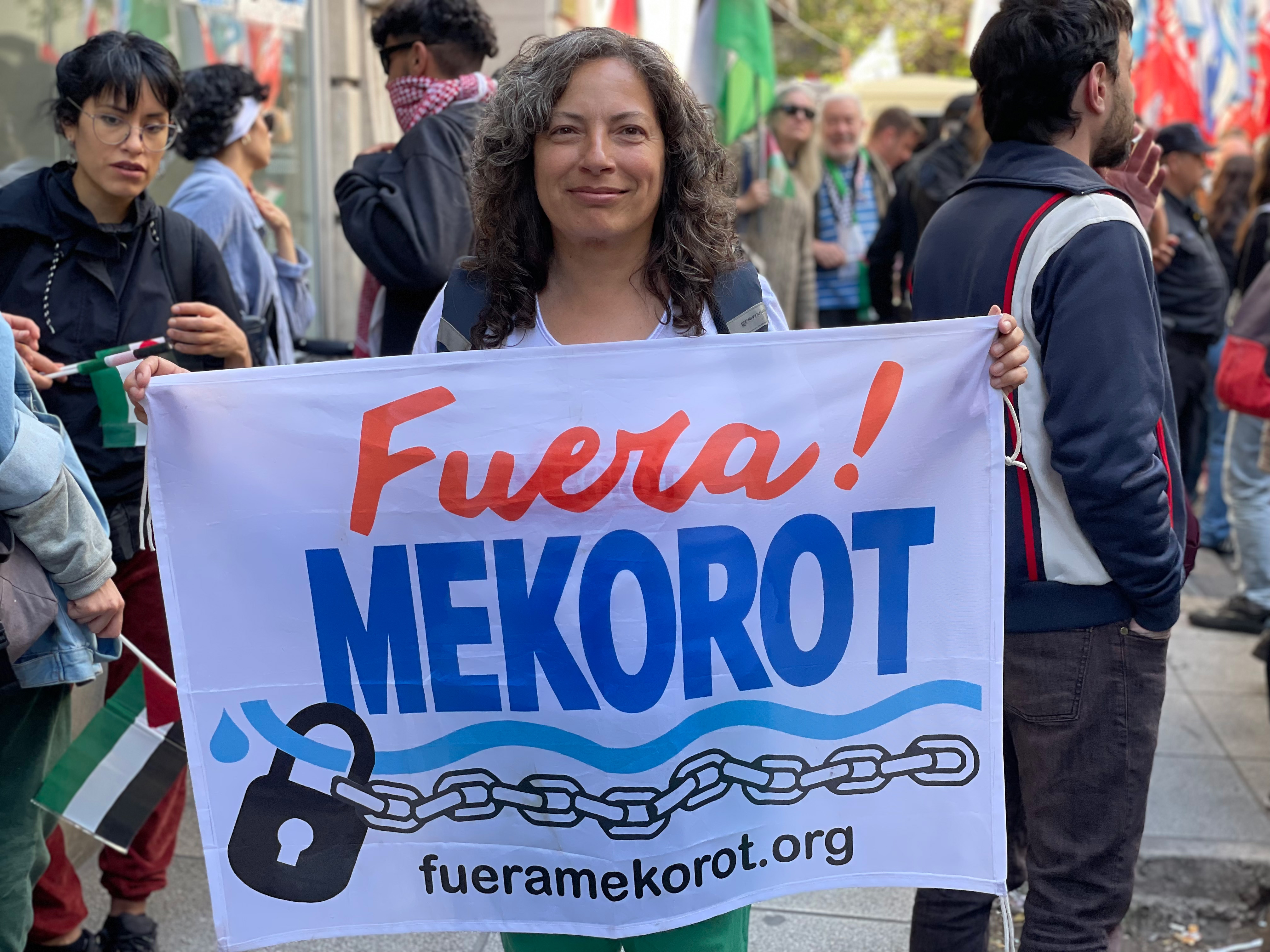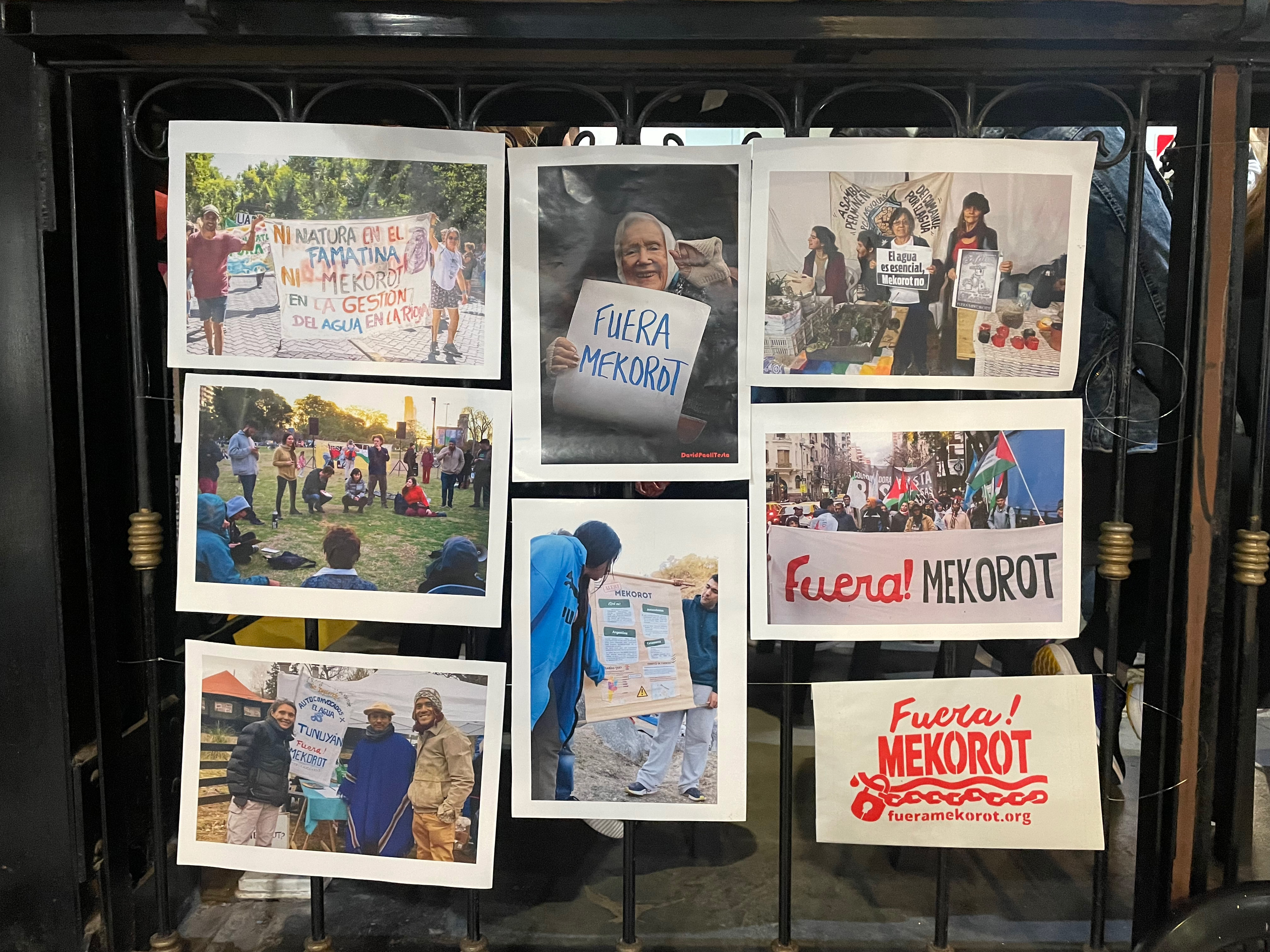
Buenos Aires, Argentina – The upscale neighbourhood of Recoleta was pulsing with the sound of drums and chanting last month, as protesters gathered outside the Palestinian embassy in Buenos Aires to call for an end to Israel’s war in Gaza.
But amid the sea of Palestinian flags, Silvia Ferreyra gripped a different symbol of solidarity. Above her head, she held a banner depicting a blue ribbon of water trapped behind a lock and chain. Printed above the picture in large red type was the phrase, “Fuera Mekorot”.
Ferreyra, 52, had a simple message. She wanted Mekorot, Israel’s state-run water company, out of Argentina.
Since September 2022, seven Argentinian provinces have signed wide-ranging agreements granting Mekorot significant influence over how they allocate water resources.
Yet, with Israel drawing outcry for its deadly military campaign in Gaza, Argentinian activists are looking to leverage the public attention to pressure the government into cutting ties with the company.
“We are trying to [spread] the information that this is not only something completely foreign to our country, but that in our country there is a business … causing conflict in Palestine,” said Ferreyra, a longtime organiser who works in the Argentinian Chamber of Deputies’s environmental commission.
Mekorot’s future in Argentina cannot be evaluated “without taking into account the current situation and the context of the conflict there in the Gaza Strip”, she added.
“We have to discuss the origins of this conflict more deeply.”

Controlling Palestinian water resources
Though widely seen as a world leader in water management technology, Mekorot has drawn international condemnation for its policies in Gaza and the West Bank. It has controlled water supplies in the two Palestinian territories since Israel occupied them in 1967.
Though not directly named, the company’s activities were referenced in a 2022 report by United Nations Special Rapporteur for Human Rights Michael Lynk, which accused Israel of implementing a system of “apartheid” against Palestinians.
The report identified access to water as a major source of inequality.
“The utilities and services which the [Israeli] settlements enjoy — water, power, housing, access to well-paid jobs, roads and industrial investment — are far superior to those available to the Palestinians,” it explained.
The Israeli nonprofit B’Tselem also blamed “Israel’s deliberately discriminatory” policies for water shortages in the West Bank.
In an April report, B’Tselem found that only 36 percent of Palestinians in the area had running water throughout the year. There were also wide discrepancies in water usage.
Israeli settlers in the West Bank consumed an average of 247 litres (65 gallons) of water per capita each day, while Palestinians used just 82.4 (21 gallons) — limiting their ability to meet their basic needs for hydration, hygiene, sanitation and everyday chores.
“To make up for the shortage, the Palestinian Authority is forced to purchase water from Israel’s national water company, Mekorot, at a much higher cost,” the report explained.
When Israel began its military campaign last month, it used Mekorot to cut the water supply to Gaza completely, forcing residents to drink polluted water. Hospitals, meanwhile, were left without proper sanitation.
“Israel is using its strategic control over water resources on the one hand, and water distribution on the other, as a geopolitical tool and does so in highly unequal ways,” said Erik Swyngedouw, a geographer at the University of Manchester who researches the intersection of water and politics.
Mekorot did not respond to a request for comment about its humanitarian record in Gaza and the West Bank, nor about concerns over its expansion in Argentina.

International backlash
The accusations that Mekorot has contributed to the oppression of Palestinians have prompted some groups to sever ties with the Israeli water company over the past decade.
In the Netherlands, the water company Vitens announced in 2013 that it would end relations with Mekorot after consulting with the Dutch foreign ministry. The next year, in Portugal, EPAL — the company that provides water to the city of Lisbon — likewise ended a technology exchange deal over Mekorot’s actions in the Palestinian territories.
And in 2014, the Argentinian province of Buenos Aires scrapped a deal with the company to build a desalination plant after public protests.
However, Mekorot continues to enjoy partnerships around the world. Its projects range from a water system in Mexico to a desalination plant in Morocco.
Further support comes from Argentinian governmental institutions, including the Ministry of the Interior. In February, Interior Minister Eduardo de Pedro led the country’s national water authority and a public-private investment body in signing agreements to transfer control over water administration in multiple provinces to Mekorot.
With the world’s sixth-largest Jewish population, Argentina has traditionally been an ally of Israel, and the countries maintain strong bilateral relations through institutions like the Argentine-Israeli Chamber of Commerce.
As Argentina faces a historic drought, government officials have praised Mekorot for its efficiency and technological prowess, with Interior Minister de Pedro saying that Israel offers an “example” for “managing a resource as scarce as water”.

Water as a commodity
Yet organisers of “Fuera Mekorot” — the movement to expel Mekorot from Argentina — are concerned about the impact the company might have on the country.
Marta Maffei, a former deputy in the National Congress, is among those who oppose Mekorot’s expansion in Argentina. She has advocated for a law to protect water access as a basic human right.
“Why should a state enterprise that manages water as a form of social control come to Argentina?” Maffei said. “In our territories, there are also Indigenous peoples, there are poor peasant communities, who demand their water.”
Maffei’s home province of Rio Negro signed an agreement with Mekorot in February to transfer a number of responsibilities to the company, including calculating the “economic value” of water and drafting a proposal for an authority to regulate drinking water and sanitation services.
The area is already a hotspot for fracking, an industry that uses large amounts of water to extract oil and natural gas, and clashes have erupted between local groups and police over water access.
Mekorot’s representatives have indicated they would approach water as a commodity to finance future growth, a prospect that has alarmed some advocates.
“The water bill has to cover all costs plus the costs of future investment,” Diego Berger, Mekorot’s international coordinator for special projects, said in a March interview with the YouTube channel Alterrados.
The commodification of water resources, however, comes with risks, according to Swyngedouw, the Manchester University geographer.
It could have “profound negative social [and] ecological consequences for small peasants, Indigenous people and others who depend on water access for their livelihoods”, he said.
A business-based approach to water access also threatens to conflict with traditional Indigenous views.
“From the Western perspective, [water] is called a ‘resource’,” said Miriam Liempe, the Indigenous relations secretary for the Argentine Workers’ Central Union and a member of the Fuera Mekorot coalition.
“However, [Indigenous] peoples call it a brother, like something that has life — like the trees, like the birds.”
A member of the Mapuche people, Liempe said what worries her most about Mekorot is what she calls the company’s failure to consult Indigenous groups when planning water management projects.
If projects like diverting rivers lead to the displacement of Indigenous groups, Liempe said they could violate international law.
According to the International Labor Organization’s 1989 Indigenous and Tribal Peoples Convention, Indigenous peoples “shall not be removed from the lands which they occupy”, and any attempt at relocation requires “free and informed consent” from the groups involved.

Organising against Mekorot
As Mekorot continues to make advances in Argentina, Ferreyra said her organisation’s biggest obstacle has been a general lack of awareness among Argentinian people. After the war in Gaza broke out, she and other activists held a series of events about Mekorot’s activities in Argentina.
“We have been in a process of trying to establish an awareness of what Mekorot is,” Ferreyra said. “It’s not a very well-known company.”
Hasan Najjar, an Argentinian who was born in Gaza, said he only found out about Mekorot’s presence in Argentina when he attended a protest where Fuera Mekorot organisers were present. But the company’s actions did not surprise him.
“They have experience against Indigenous people, in killing us slowly, like with food and water or with bombs,” Najjar said.
Silvia Muñoz, who works at a food kitchen in the suburbs of Buenos Aires, said she heard about Mekorot for the first time at a panel discussion in the city’s historic San Telmo neighbourhood.
“It’s a business for them, but a mafia business,” Muñoz said. “It makes me concerned.”
Ferreyra believes she has made progress in raising awareness of Mekorot’s presence in Argentina. But she has no illusions that blocking the company’s business ambitions will be easy.
“We know that this is not something simple, because we understand the involvement and weight that Israel has in a lot of aspects that make up the economic life of our country,” Ferreyra said. “We still have a lot to do.”







